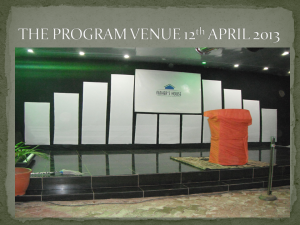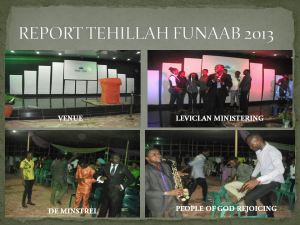A Dozen Voice Training
Exercises
And some other bits of advice
Your vocal cords are muscles, and like any muscles they
can become tired and damaged. The following exercises
have been devised and compiled by my friend and
singing teacher, Andrea, and typed up by me with
various enhancements and addition of theory.
The first two exercises are to loosen off the muscles in
the next, around the vocal cords.
1. Starting with your tongue on the RHS of your mouth,
make a figure of 8, so that your tongue goes across
your top teeth, to the middle, then crosses to the
bottom teeth, along to the LHS of your mouth, then, up,
and across the top. Keep your mouth closed for this.
2. Put the tip of your tongue behind your bottom set of
front teeth. Let your jaw drop and gently push out your
tongue. Repeat a few times.
The following exercises are mainly for exploring your
natural range , and should be tried at different pitches,
preferable gently undulating pitches:
3. Ga-ga! – Make baby noises up and down randomly
within your natural voice range . Try with all the vowel
sounds, e.g. ga-ga, ge-ge, gi-gi, go-go, goo-goo
4. Bzzzzzz! – Make buzzing noises like a bee. The idea
here is to find resonances in your mouth and sinuses.
Try changing the shape of your mouth.
5. Innnnnnnng-uh!. This is mainly to find natural
resonances in your sinuses. Try words like: Ding, Ping,
Zing, Ting. Hold the ‘i’ sound so that it makes your
sinuses tickle.
6. Mmmmmm! – Close your lips, but pull your lips back
into your mouth over your teeth. Make a humming
noise, and allow your lips to relax, so they are just
closed. Change the pitch of your voice until your lips
start to tickle. Hold this note for a while and then find
other notes / frequencies where this happens.
7. Hah! – Imagine you are digging a hole (you have to
do the actions too!): as you dig into the ground, exhale
with a “HUH!” sound. Lift the soil, and as you chuck it
over your shoulder, make a “HAH!” noise. Repeat until it
gets too silly. You can also practise this by pretending
to do Kung-Fu moves – punches and kicks and the
likes.
8. Oooooh! – Slidey continuous journey up and down
your natural range – Okay, you have to move your arms
for this one: high notes – arms up in the air, low notes,
bend your knees and hang your arms like a monkey.
9. Me – me – me… etc., up and down your natural
range , for ages, for fun…, then all of the following: mah,
mi, may, my, moo, mu. You can mix them up too.
10. Yah! or Yar! – for this one, just let your jaw drop
loosely to a loose hanging – don’t force it open, do it for
a while – 20 times or so.
11. Wow! – Start as low as you like, and go up to as
high as you like within your natural range , then back
down again. Wwwww-aaaaaaaa-oooooo-wwwww. You
gotta open your mouth as wide as it needs.
12. La-la-la – this is the classic, and most heard of the
exercises. Try using different scales, ascending through
natural major / minor scales, and also chromatic and
triadic (chord) scales, or just mess around with arbitrary
notes or pitches. Try this with ah-ah-ah-ah…, and then
all the other vowel sounds, instead. It’s more difficult,
apparently (thanks Claire).
Natural range – this is from the bottom note of your
vocal range to the highest note you can reach before
your voice breaks and goes into “falsetto”. You can
practise most of these in a falsetto too, but be warned
it can sound silly. It’s best to learn just not to care
about how silly it sounds.
Other things to do…
General Advice
If you want to keep your throat clear of phlegm –
avoid milk and dairy products.
Making a drink of half a lemon squeezed into a pint
of water can be used to clear phlegm.
Don’t eat late at night – this can cause acid reflux,
which is when the stomach acid comes back up the
throat and damages the vocal cords.
Avoid smoking.
Media Students
Read sections of books, newspapers and magazines out
loud. Try recording it with a tape recorder (remember
those?), a mini-disk, mp3 stick recorder, on your
computer. Don’t worry if it only has a cheap
microphone.
Analyse what you have recorded – be careful not to go
“this is rubbish, I have a rubbish voice, I hate it… etc..”
The important thing to think is “How can I improve my
voice?” (or reading, or singing, or whatever…)
Listen to other voice artists. Ask the question: What
makes them good?
Also ask this of yourself: Could you improve the
definition of the words? Could you improve your
breathing technique? Would it help if you moved your
mouth or lips more? Would it sound better if you were
more relaxed?
Try getting involved in a local, college or hospital radio
station. It’ll be voluntary, but the experience will be
invaluable.
Vocalists / Singers
Relax. Try exercises 1 and 2 if you feel your voices is
tense. You can also try other relaxation or yogic
exercises to relax you before singing. What about having
a bath?
Sing along with anything. It’s probably best to start
with stuff you like. As with, spoken word, try recording it
with a tape recorder, a mini-disk, mp3 stick recorder,
onto your computer, etc. You can get karaoke backing
disks, or download midi or mp3 karaoke files off the
internet. Sing everywhere, as quiet, or as loud as you
like. To hell with whoever my be listening.
Analyse what you have recorded – be careful not to go
“this is rubbish, I have a rubbish voice, I hate it… etc..”
The important thing to think is “How can I improve my
voice?”. Watch for lead-ins to notes, try to keep the
notes you want to deliver as precise as you can – don’t
forget the gaps are as important as the notes.
Try singing through a PA / amplified system, and get
used to your own voice. Remember: the microphone is
your best friend, learn to use and love it. You can use it
to amplify even the quietest, most subtle sounds that
you would just not hear in most performance situations
without a mic.
Listen to other voice artists. Ask the questions: What
makes them good? What do I like about their voice /
style? Do they talk like that in normal day to day life?
Also ask this of yourself: Could you improve the
definition of the words? Could you improve your
breathing technique? Would it help if you moved your
mouth or lips more? Would it sound better if you were
more relaxed?
When recording, try using as many voices, characters,
pitches, octaves, harmonies, or whatever. If you are
using computer based recording, go nuts, record
everything. What is there to lose other than time? Use
as many voice resonances as you like and try mixing /
blending them together.
You can make your voice sound sweet, rough, distorted,
angry, childish, silly or whatever. Try getting as many
emotions or imitations into your practise, but be careful
not to push your voice too hard – you may damage your
vocal chords. Try exercises 1&2 above if your voice gets
tired, and stop if it begins to hurt. Drink plenty of water.
Try editing out parts of your recording – remember what
I said about gaps (or rests). Edit out waste noises, use
fades to clean up the recording, and apply this to your
singing style. It saves time in a studio in the long run if
your vocals are right from the off, so learn what sounds
good in the recording.
Learning to sing well can be a long process. Take your
time to learn your own voice and what you can do with
it. Over time your voice will develop to be more
adaptable. Choose songs that are easy for you to sing
at first, then gradually bring in more challenging songs
as you get better.














